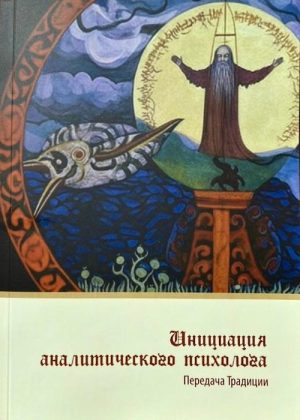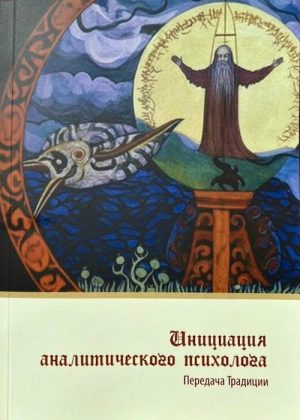1
/
of
1
My Store
Initiation of an Analytical Psychologist. Transmission of the Tradition
Initiation of an Analytical Psychologist. Transmission of the Tradition
Regular price
€15,00 EUR
Regular price
Sale price
€15,00 EUR
Taxes included.
Quantity
Couldn't load pickup availability
In Russia, you can buy this book in the online store of the publishing house "Fairy Tale and Myth ".
From the author:
In the spring of 2019, Skazka i Mif Publishing House launched a project to conduct a series of seminars under the general title "Analyst Initiation. Transfer of Experience." We invited senior colleagues—Jungian analysts, teachers, and supervisors of the International School of Analytical Psychology ISAP-Zurich. Six sessions were planned in total: we were expecting Paul Brütsche, Bernard Sartorius, John Hill, Murray Stein, Christa Robinson, and Natalia Baratoff. The course included lectures and supervisions aimed at introducing participants to the tradition of analytical psychology, with its classical spirit and play with symbols.
Paul Brutsche was the first to arrive in Moscow. On September 13–14, 2019, he held a fascinating seminar, "Symbols and Transformation. The Meaning of Symbols in the Analytical Process. Analytical Interpretation of Drawing."
Next, we hosted Bernard Sartorius. On December 7th, before his lecture, "The Pilgrimage to Mecca: Its Possible Symbolic Meaning in Our Time on a Personal and Collective Level," we invited the participants to visit the mosque. On December 8th, a group discussion took place—a discussion of the lecture and the symbolic meaning of Islamic art and architecture.
Next, we were waiting for Murray Stein. But, unfortunately, he couldn't make it due to the coronavirus pandemic. The in-person meeting never took place. Instead, we moved online, and as a result, Stein held two seminars instead of one. On March 13-14, 2020, the "Wounded Healer" seminar was held, and on October 17-18, "Hephaestus: The Pattern of Introversion" was held.
In September of that same year, 2020, two online seminars by John Hill were held: on September 26th – “Anger Without Losing Courage,” and the following day – “Icons and Idols: Bringing Sacred Heritage Back to Life.”
Unfortunately, it was not possible to hold Krista Robinson's seminars on working with the I Ching and Natalia Baratoff's seminars on fairy tales in the project.
Based on the results of this series, we decided to publish a book whose goal was absolutely identical to the project's. And only now, three years after the seminars concluded, has this become possible.
In Murray Stein's article, you'll read about Carl Gustav Jung's own initiation, which he described in detail in his "Red Book." Bernard Sartorius discusses the development of the Jungian analyst in contemporary realities. In his first article, John Hill demonstrates how the soul responds to an encounter with the numinous, and in his second, he combines two important practices—psychodrama and Jungian fairy tale experience—inviting us not to choose between them but to combine them. Paul Brutsche continues his discussion of the creative power of the soul through the images of Jung's "Red Book." We are delighted that in this collection you have the opportunity to engage with the work of Christa Robinson—her article on working with the I Ching is piercingly candid.
We have also added to the collection "Introduction to the I Ching" by Rudolf Ritsema and Shantena Augusto Sabbadini—the result of half a century of work by the Eranos research center, founded in 1933 in Switzerland by Olga Fröbe-Kapteyn (1881–1962) with the help of Carl Gustav Jung, who had a decisive influence on Eranos's early work. Eranos' I Ching takes a unique approach to the I Ching, examining it from the perspective of synchronicity rather than predictive power.
We also invited our Russian colleagues—Elena Purtova, Vsevolod Kalinenko, and Yulia Kazakevich—to share their experiences of their first encounters with living Masters of Jung's analytical tradition and to discuss their choices and preferences in their work. It's a shame Natalia Baratoff was unable to participate in this part of our project.
In conclusion, I'd like to share my own experience with a book. It was 1994. I still had no idea what I wanted to be when I grew up. Fate had me enrolled in preparatory courses at the Institute of Psychology and Sociology. I was taking general psychology courses, but I was desperately bored; there was no real meaning to it all. To get myself interested, I bought my first psychology book at a thrift store—a dictionary. I can't say it helped me much, but it did give me something. Then I bought a second book—Jung's Metamorphoses and Symbols of the Libido—without really thinking about what it was. And it was love at first sight! I started reading and realized: I was home. It turned out that everything that was important to me, everything I lived and breathed—myths, feelings, imagination, and much, much more—could very well be applied to my professional life as well. So I was drawn into the whirlwind of my initiation into analytical psychology, and meaning began to emerge for me.
I wish you, dear readers, a fascinating journey with the Masters of Analytical Psychology. Perhaps some of you, reading this collection, will feel at home, hear Jung's words, and find your own path.
Olga Kondratova
May 30, 2023, Ljubljana
Contents of the book:
From the author.
Bernard Sartorius. Initiation into the Profession of Analyst.
Murray Stein. Jung's Red Book as a New Link
in Aurea catena.
Elena Purtova. Transmission of Tradition: Between Learning
and teaching.
John Hill. Icons and Idols: The Rebirth of the Sacred
heritage.
Yulia Kazakevich. Initiation into the Profession. The Wounded
healers. Healed by the wound.
Paul Brutsche. The Creative Power of the Soul: Central
evidence from Jung's "Red Book".
Vsevolod Kalinenko. About the Jung Institute program
in Moscow (1998–2000).
John Hill. Fairytale Drama: Acting Out the Rituals of Play,
laughter and tears.
Krista Robinson. Cultural Trauma and the I Ching.
Rudolf Ritsema, Shanten Augusto Sabbadini. Introduction
in the "Book of Changes".
About the authors.
When placing your order, please note that shipping is calculated by weight. This book weighs 0.4 kg. We charge slightly more for the books to account for the packaging.
Share

